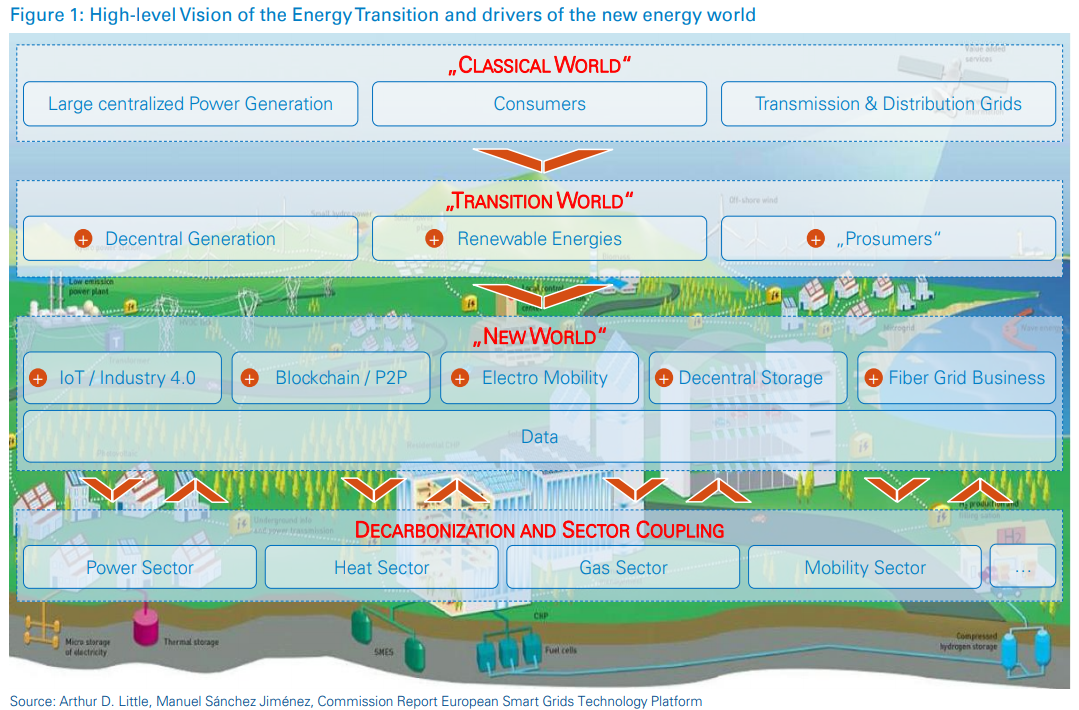3 min read • Energy, Utilities & Resources, Information management
The TSO CIO agenda 2020
Energy transition and digitalization transform the Transmission System Operator and it’s IT strategy


Executive Summary
Energy transition, IT innovation and digitalization have a significant strategic and operational impact for a transmission system operator (TSO). The mission of a Chief Information Officer (CIO) and the IT department will develop from implementing business requirements and providing IT services to a transformation enabler, if not a driver. Successful CIOs have key topics at the top of their agenda:
- Create a “Digital TSO” vision, milestones and roadmap jointly with executive management and possibly the CDO, which ensures commitment, support and momentum for transformational activities
- Achieve early success with digital pilot cases allowing employees and management to feel and understand digital impact in their day-to-day business
- Expand the IT delivery model from “run” to “transform” the business by using agile project management and grow IT development capabilities
- Bring information and operational technology (IT and OT) under one responsibility of the CIO
- Make people with the best business and IT “sense” to act as “demand managers” for the business with a solid line to the CIO – inside or outside the IT department
Beyond that, CIOs take many more topics on their agenda. Understanding the CIO agenda, allows executives as well as business managers to create value from IT by being informed and involved early and with a look into the future.
Setting the scene
Information technology has never had greater impact on the power transmission business than it has today. Besides copper and steel, silicon and data are becoming key assets in the TSO (as well as DSO) business. The dynamics and complexity of energy transition are meeting the disruptive power of digitalization. The mass of data is growing faster than ever while data protection requirements require a clear data governance. New digital start-ups are mushrooming, as are cyber-security threats. Business requirements are rising, whether this is due to regulatory changes, new transmission technologies or newbuild projects. Besides being an innovation driver, IT still must fulfill its “workhorse” role: availability, security and performance to ensure seamless running of the business. Top management becomes aware of the fundamental, even business-critical, role IT plays nowadays.
We conducted interviews with TSO CIOs and included our own international experience in the TSO business in Europe, which had several questions in scope:
- What market-driven business requirements towards IT do you expect, e.g. regulatory, standards, transmission technology etc.?
- What major IT technology innovations do you see, what is the impact on business model and business processes, where will you put your focus on?
- Which business processes will face significant improvement needs esp. IT-supported?
- What key IT technology decision are relevant, pending or have you already made?
- What IT budget trends do you see, where do you stand in key figures?
- How is IT/business collaboration today, and what trends do you expect?
- What is you experience in outsourcing and which sourcing trends do you expect?

DOWNLOAD THE FULL REPORT
3 min read • Energy, Utilities & Resources, Information management
The TSO CIO agenda 2020
Energy transition and digitalization transform the Transmission System Operator and it’s IT strategy

DATE

Executive Summary
Energy transition, IT innovation and digitalization have a significant strategic and operational impact for a transmission system operator (TSO). The mission of a Chief Information Officer (CIO) and the IT department will develop from implementing business requirements and providing IT services to a transformation enabler, if not a driver. Successful CIOs have key topics at the top of their agenda:
- Create a “Digital TSO” vision, milestones and roadmap jointly with executive management and possibly the CDO, which ensures commitment, support and momentum for transformational activities
- Achieve early success with digital pilot cases allowing employees and management to feel and understand digital impact in their day-to-day business
- Expand the IT delivery model from “run” to “transform” the business by using agile project management and grow IT development capabilities
- Bring information and operational technology (IT and OT) under one responsibility of the CIO
- Make people with the best business and IT “sense” to act as “demand managers” for the business with a solid line to the CIO – inside or outside the IT department
Beyond that, CIOs take many more topics on their agenda. Understanding the CIO agenda, allows executives as well as business managers to create value from IT by being informed and involved early and with a look into the future.
Setting the scene
Information technology has never had greater impact on the power transmission business than it has today. Besides copper and steel, silicon and data are becoming key assets in the TSO (as well as DSO) business. The dynamics and complexity of energy transition are meeting the disruptive power of digitalization. The mass of data is growing faster than ever while data protection requirements require a clear data governance. New digital start-ups are mushrooming, as are cyber-security threats. Business requirements are rising, whether this is due to regulatory changes, new transmission technologies or newbuild projects. Besides being an innovation driver, IT still must fulfill its “workhorse” role: availability, security and performance to ensure seamless running of the business. Top management becomes aware of the fundamental, even business-critical, role IT plays nowadays.
We conducted interviews with TSO CIOs and included our own international experience in the TSO business in Europe, which had several questions in scope:
- What market-driven business requirements towards IT do you expect, e.g. regulatory, standards, transmission technology etc.?
- What major IT technology innovations do you see, what is the impact on business model and business processes, where will you put your focus on?
- Which business processes will face significant improvement needs esp. IT-supported?
- What key IT technology decision are relevant, pending or have you already made?
- What IT budget trends do you see, where do you stand in key figures?
- How is IT/business collaboration today, and what trends do you expect?
- What is you experience in outsourcing and which sourcing trends do you expect?



